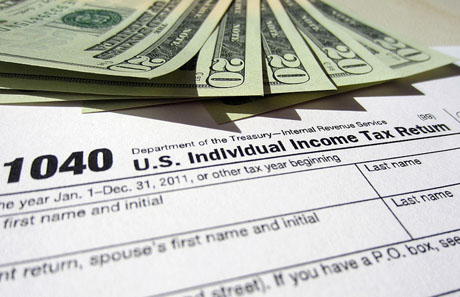Cops who make a buck on the side directing traffic or working uniformed security gigs will remain exempt from business taxes if the City Council on Tuesday updates the tax code. The council will consider the update along with a resolution to extend the deadline for a tax amnesty program, which allows delinquent self-employed taxpayers to get current without being penalized.
In practice, the exemption already includes police, says Wendy Sollazzi, a division manager in the city’s Finance Department. If an officer dons a city uniform to work a side job patrolling a school, a church or an intersection, the tax exemption applies.
“If they’re working on their own time and being paid separately from the city, but still wearing a city uniform, they’re representing the city and have to enforce our codes,” Sollazzi says. “The exemption recognizes that.”
Private security, private investigations or other side jobs that don’t require a uniform will still require officers to pay taxes owed from January 2009 to now.
A 2012 audit found that the San Jose Police Department’s secondary employment practices lacked oversight, making it easy to defraud.
“The secondary employment program has lacked substantive management oversight until very recently,” reads the report by Sharon Erickson, the city’s auditor. “This, combined with problems identified during the audit as well as the program’s highly decentralized system of coordination, results in a culture susceptible to the risks of fraud, conflicts of interest and inequity.”
The audit found officers overlapping reported time and recording longer-than-actual working hours. Officers earned about $6.1 million in secondary work in 2011, the audit estimates. Officers in charge of secondary employment oversight for the department did not immediately return calls for comment.
Others, such as sports umpires and many other small business owners, behind on their taxes still have to pay, but they’ll get more time to apply for the amnesty. The tax break program started in December. The council this week will consider extending it through the end of May and adding a hardship exemption to qualifying businesses for the $38 application fee.
Other items on the San Jose City Council agenda for March 5, 2013:
• The city auditor reviewed the Office of Economic Development and concluded that there’s room for improvement in its mission to “catalyze job creation, private investment, revenue generation and talent development and attraction” in San Jose.
Namely, the city should better track the efficacy of incentives like discounting developer fees to see if it’s worth the cost to city services, the audit says.
The OED’s current-year budget is $13 million, but it holds sway over $4 million more of the city’s general fund. The office puts together incentive packages for companies and administers policy changes like the cuts to traffic impact fees and construction taxes the council recently OK’d through 2014.
But the city hasn’t been able to deliver on its end of the bargain sometimes, and it’s racking up a tab. In the past two years, five companies have come up with custom incentive packages, which require the city to shell out $9.1 million in tax refunds, grants or reimbursements. Only $1.7 million has been paid so far, the audit finds.
• The city’s aging roadways need repaving and it’s up to elected officials to figure out how to fund it. Some ideas being tossed around: ask voters for bond money; coordinate a regional ballot measure with the Santa Clara Valley Transportation Authority (VTA) to extend and amend an existing sales tax; or support state legislation that aims to reduce the approval threshold for a transportation tax from two-thirds to just 55 percent.
The deteriorating condition of the city’s 2,400 miles of roadway is a cause for “serious concern,” the staff report says. Unless something changes, future funding will cover only 20 percent of the need for repairs—$20 million to cover $100 million.
A backlog of deferred maintenance soared to $339 million last year and is on pace to balloon to $870 million by 2020, the memo says. Meanwhile, the miles of streets in bad condition will jump from 580 (24 percent of our city streets) to 1,400 miles (58 percent) in that same timeframe.
• (UPDATE: This item has been deferred.) The company looking to build the region’s eighth Rocketship charter school needs the council’s approval to obtain $24 million in tax-exempt bonds. Launchpad Development, the for-profit outfit that wants to build the nonprofit charter school in San Jose’s Tamien neighborhood, needs approval by elected officials before the state finance authority will give them the go-ahead to secure bond debt.
• (UPDATE: This item has been deferred.) A deal with Samsung to develop its North American R&D headquarters comes up for discussion again Tuesday. The semiconductor giant wants to expand its north San Jose building from 300,000 square feet to 680,000 split between two 10-story towers.
The agreement would give Samsung $500,000 in capital improvement help to install new equipment and another $500,000 in tax reimbursements over the next decade.
• The newly renamed San Jose/Santa Clara Water Pollution Control Plant, a.k.a. The Plant, is asking the council to approve $1.2 million in payments for temporary staffing through 2014 with the option to renew it for another four years.
• A $1.8 million state grant will pay for environmentally friendly storm water drains that prevent pollutants from entering creeks and waterways. The money comes from a ballot measure voters passed in 2006, which allowed state lawmakers to allocate $1.5 billion for water projects that reduce contamination.
WHAT: San Jose City Council meeting
WHEN: 1:30pm Tuesday
WHERE: City Hall, 200 E. Santa Clara St., San Jose
INFO: Office of the City Clerk, 408.535.1260


if it were not for off duty officers trying to make ends meet by working pay jobs this city would fall apart has been going on for 30+ years. Now the city wants to bite it’s own hand. Be careful what you wish for.